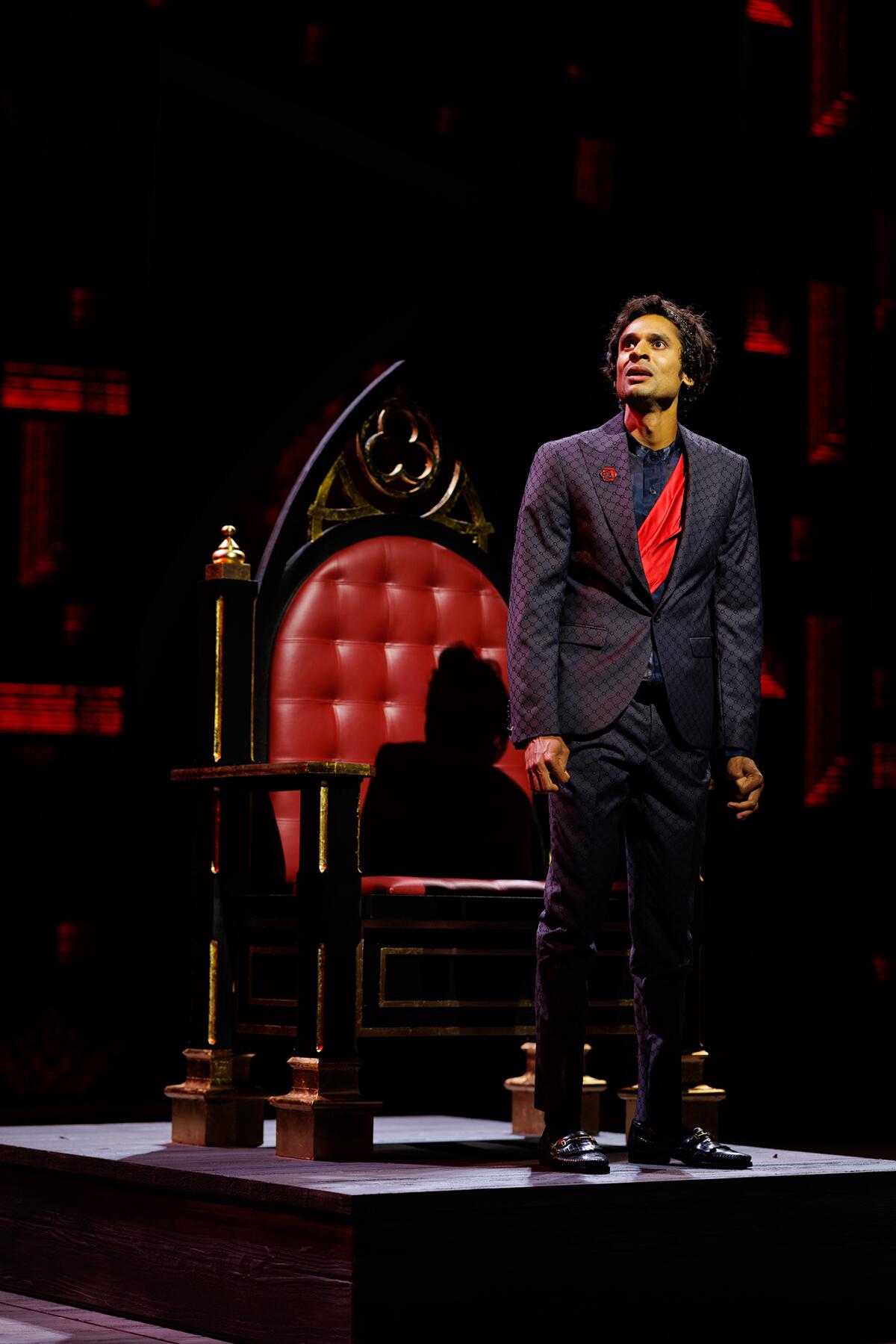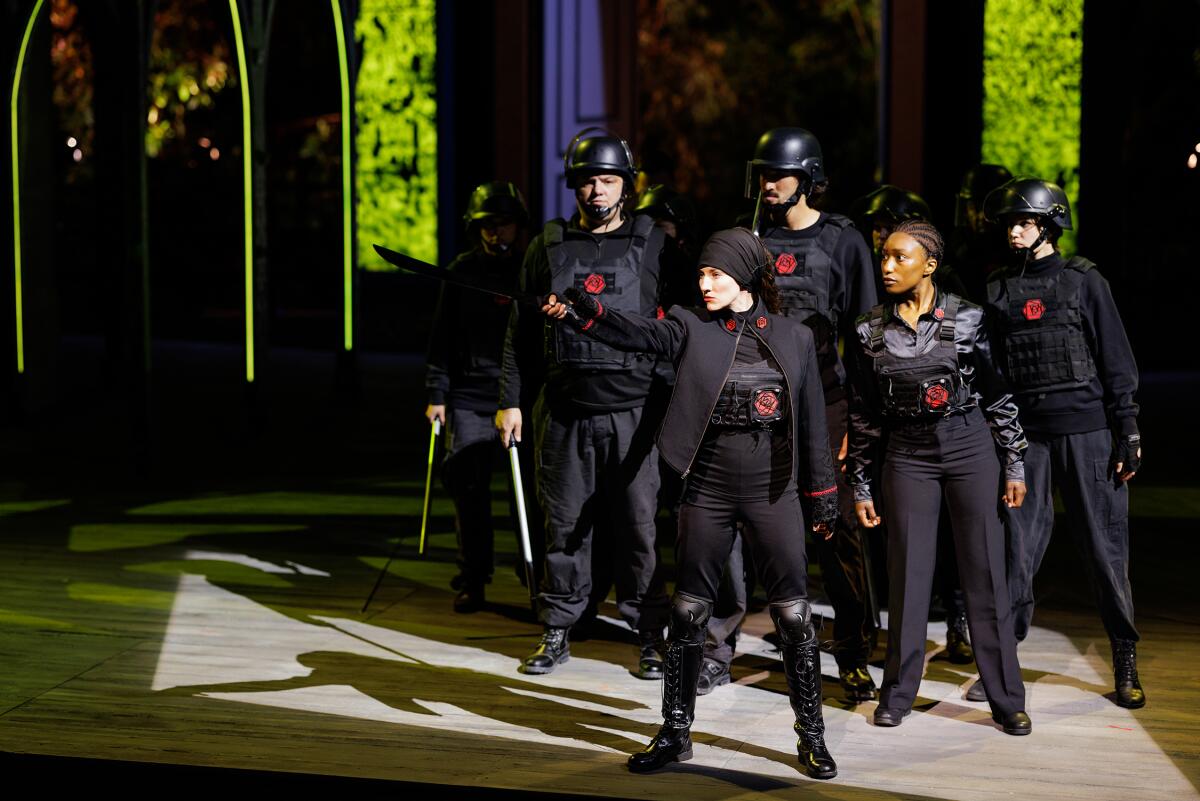Productions of “Henry VI,” an early history play by Shakespeare written in three parts, don’t come around all that often. I’ve seen two in my lifetime, both of them wisely abridged into two parts.
The Shakespeare of “Henry VI” isn’t yet the Shakespeare who wrote “Hamlet,” “Henry IV, Parts 1 and 2” or “King Lear.” He’s still wrestling with the influence of Christopher Marlowe. The thunderous rhetoric, which crowds out introspective soliloquy, moves into Broadway power ballad territory when emotions run high. And the bloody melodrama of history is indulged with the malevolent glee that made Marlowe’s “Tamburlaine the Great” Elizabethan box office gold.
What “Henry VI” may lack in subtlety, however, it more than makes up for in propulsive excitement. Barry Edelstein’s entertaining two-part adaptation of “Henry 6” at the Old Globe’s Lowell Davies Festival Theatre gives Shakespeare’s epic an audience-friendly update.
The shift from Roman to Arabic numeral in the title suggests the revival’s relaxed, contemporary tone. The broad-strokes treatment, by turns suspenseful and rollicking, works well in an outdoor summer Shakespeare presentation that makes the Wars of the Roses seem Spielberg-ian in intrigue and suspense.
The production succeeds in making “Henry 6” not only accessible but also relatable. It doesn’t take much to make the plight of a nation imploding from partisan strife and civil unrest speak to a MAGA-weary American audience, but Edelstein leans into the parallels.
“One: Flowers and France,” the first of the two parts, has all the political backbiting and scheming of a closed-door Republican caucus to decide the next Speaker of the House. “Two: Riot and Reckoning” turns Jack Cade’s populist uprising into a Union Jack version of the Jan. 6 insurrection, complete with Cade (Tally Sessions) kitted out like the QAnon Shaman.
There’s nothing academic about Shakespeare’s handling of this turbulent period of English history after the death of Henry V ratcheted up the bitter power struggle between the House of Lancaster and the House of York. Action-packed drama is the thing, and the contest between powerful yet flawed claimants to the throne is treated here as a pop-cultural thrill ride.

Keshav Moodliar as King Henry VI in “Henry 6.”
(Rich Soublet II)
Edelstein shrewdly recognizes that if Shakespeare were alive today, a talent spotter at Marvel Studios would likely have tried to sign the young writer the moment he landed at LAX. The shifts in tone, from savage comedy to brutal violence, will appeal to fans of Quentin Tarantino and “Richard III” alike. (“Henry 6” provides the origin story for the villainous Richard, who is played here by Gregg Mozgala as a young psychopath in training.)
There’s a tremendous amount of history to get through in “Henry 6,” but the production has fun catching the audience up on how the Wars of the Roses came about. Shakespeare would eventually write the pre-story of this saga in the cycle of history plays that includes “Richard II,” “Henry IV, Parts 1 and 2” and “Henry V.” Edelstein supplies this essential background in a prologue that sets the staging’s buoyant tone.
“Flowers and France” is consumed by the battles between the English, valiantly commanded by Lord Talbot (Sessions, establishing himself in this martial role before going on to play the wild card Jack Cade), and the French, courageously led by Joan la Pucelle (Cassia Thompson), the mystical young woman who’s either divinely or satanically inspired. Infighting among the English provides an opportunity for the French to win back lands conquered by Henry V.
Of a markedly bookish, almost monk-like disposition, Henry VI (Keshav Moodliar) is not only too young to rule but also temperamentally unsuited to the role. As dissension at home contributes to the humiliating loss of territory in France, the fight over the throne he shakily occupies exponentially intensifies.

Elizabeth A. Davis, front, as Queen Margaret, and Cassia Thompson, second from right, as Prince Edward with the cast of “Henry 6.”
(Rich Soublet II)
At one point, Richard Plantagenet (William DeMeritt), a Yorkist, hauls out an overhead projector to make the case for why he and not Henry VI should wear the crown. Part of the fun is the byzantine nature of his genealogical argument, which he puts forth with the breezy confidence of a math teacher going through a geometric proof.
Forget about the divine right of kings: The vying monarchs of “Henry 6” are forced to appeal to military might and unholy alliances.
The plot moves with the velocity of a gangster movie with a sneaky sense of humor. Edelstein, one of the most knowledgeable American Shakespeare directors working today, streamlines the texts to make the experience even more propulsive. I drove to San Diego to brush up my Shakespeare but was reminded of just how much fun these works can be when approached in the right playfully theatrical spirit.
This production is a hugely ambitious undertaking for the Old Globe. Measured in cast size, budget and sheer epic sweep, it’s the largest Shakespeare project the theater has ever done. The ensemble includes 30 actors onstage and many more on video, who appear fleetingly as spirits, royal subjects or rabble-rousers.
Nearly 1,000 San Diegans have had a hand in the making of this production, which Edelstein, in a program note, characterized as bringing the Old Globe’s “community-based work” and “professional art-making work together in unprecedented ways.” In addition to performance opportunities, community members were invited to collaborate on the well-synchronized elements of the production design.
With this version of “Henry VI,” the Old Globe has now completed the Shakespeare canon, joining an exclusive list of American companies that have produced all of the plays. The philanthropic support of Roy Cockrum, who started a foundation devoted to supporting bold nonprofit theater productions after hitting the Powerball jackpot, was integral to the achievement of this milestone.
At a time when regional theaters are scaling back and playing it safe, the Old Globe has not only done something monumental but also has done it entertainingly well. You can tell when theatergoers are gripped by a story. And Edelstein brilliantly calibrates the pacing of the plot to keep the audience hooked from start to finish.
The live accompaniment of percussionist Nathan Hubbard and guitarist Martin Martiarena, performing original music by Julián Mesri lends the battlefield scenes a rock band vigor. (The sound changes to British punk when Jack Cade enters the story.) Chelsey Arce’s choreography and Caite Hevner’s projection design help Edelstein gracefully fast-forward through long swaths of bloody history.
Anachronism is drolly permitted as the French celebrate Joan’s victories with an impromptu cabaret performance of “La Vie en Rose.” And a Mike Pence reference is comically smuggled in when Cade’s rebellion goes into murderous overdrive.
Occasionally, the production’s speed results in some narrative blurriness, as happens in the later stages of “Flowers and France.” The acting in “Riot and Reckoning” loses a bit of discipline as the ranting grows louder along with the melodramatics.
But the performances have a vivid clarity that helps an audience sort out the story. If “Henry 6” sometimes plays like a political cartoon, it’s because Shakespeare wrote it that way. Edelstein is taking his cues from the text, though his cast sometimes struggles when the bellicose mood switches abruptly into high pathos.
Moodliar’s Henry VI plays the royal martyr with a mix of student idealism and naivety. He’s no match for his fearless and fiercely ambitious wife, Queen Margaret (a potent Elizabeth A. Davis), who wages an all-out war against all potential usurpers.
William DeMeritt has the classical poise to pull off the combination of patience and fury, wisdom and impetuous bravery that characterizes Richard Plantagenet, the father of the future Richard III. Mozgala, who played a version of Shakespeare’s malign Richard in “Teenage Dick,” Mike Lew’s play inspired by Shakespeare about a teenager with a disability taking revenge on his classmates for their cruelty, now gets to play the Machiavel in all his lip-smacking villainy.
Sessions’ undaunted Talbot and Thompson’s lion-hearted Joan make perfect foils. Mahira Kakkar portrays Eleanor, Duchess of Gloucester, with a haughty determination that turns desperate once Margaret asserts dominance in the court. (Their clash has the flavor of a “Real Housewives” series set in medieval England.)
Kakkar has a later over-the-top turn as the elderly Alexander Iden, who gives Cade his just deserts despite her character’s conspicuous frailty. And speaking of Cade, Sessions’ flamboyant performance as the agent of anarchy bounds across the stage with a “Spamalot”-level of madcap brio.
The Old Globe’s “Henry 6” is Shakespeare for and by the people. The production considers what this history means to us today and why we should continue to care about it. Shakespeare looked to the past and created not only irresistible drama but also an image of humanity eager to find patterns in historical processes that are larger than any individual but still a product of stubborn human nature. As Edelstein’s impressive production makes clear, the chronicle we discover in “Henry 6” is the story we’re still playing out.
‘Henry 6’
When: 8 p.m. Tuesdays-Sundays. “One: Flowers and France” and “Two: Riot and Reckoning” are running in repertory through Sept. 15 (check for exceptions)
Where: Lowell Davies Festival Theatre, The Old Globe, 1363 Old Globe Way, Balboa Park, San Diego
Tickets: $40 and up. Separate tickets are required for each play.
Info: (619) 234-5623 or theoldglobe.org
Running time: “One: Flowers and France,” 2 hours, 45 minutes; “Two: Riot and Reckoning,” 2 hours, 35 minutes


